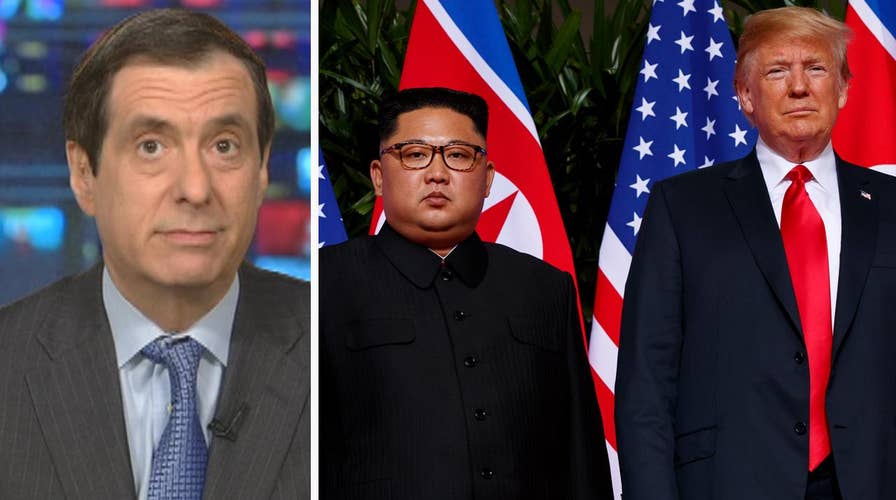Kurtz: The hypocrisy in the Trump-Kim coverage
'MediaBuzz' host Howard Kurtz weighs in on partisan coverage following President Trump's meeting with North Korean leader Kim Jong Un.
On this, perhaps, we can all agree: It is better that President Trump is talking to Kim Jong Un than exchanging threats over nuclear war.
And so the Singapore sitdown, the first ever between the leaders of America and North Korea, was a step in the right direction.
There are all kinds of legitimate criticisms to be leveled at the process. But I've really been struck by the relentless negativity of many liberal commentators. On MSNBC, Rachel Maddow and Chris Matthews went off on Trump moments after the first handshake, because he dared put his hand on Kim's back. Jeremy Bash, an Obama aide turned NBC commentator, pronounced the display of U.S. and North Korean flags "disgusting."
This much is undoubtedly true: If Barack Obama had held a groundbreaking summit with the leader of North Korea, the liberal precincts of the media would be nominating him for another Nobel Prize.
We don't have to guess about that, since they largely supported Obama's nuclear deal with Iran, from which Trump recently withdrew. (That admittedly had a whole regimen of inspections and verification, but Trump and Kim are just starting out).
And they cheered Obama's meeting with Fidel Castro and resumption of diplomatic relations with Cuba, despite the repressive nature of that regime.
Trump may have been a bit too fulsome in his praise, but there's really no dispute that Kim is an awful human being who kills and jails his opponents.
When ABC's George Stephanopoulos, scoring the first broadcast-network interview with Trump in a year, asked about Kim's "police state," with "forced starvation, labor camps, he's assassinated members of his own family," the president replied: "George, I'm given what I'm given. Okay?"
The fact is, American presidents negotiated with the old Soviet leaders, who crushed human rights, and continue to meet with China, which is also a repressive dictatorship. The world is full of bad guys. That doesn't mean the United States should refuse to engage.
The online and print coverage has followed a similar pattern. "It sure looks as if President Trump was hoodwinked in Singapore," wrote New York Times columnist Nick Kristof. "Trump made a huge concession — the suspension of military exercises with South Korea ... In exchange for these concessions, Trump seems to have won astonishingly little."
The criticism didn't all come from the left. While Salon called Singapore "Trump and Kim's Big Nothing Summit," The Weekly Standard's headline was "A Summit About Nothing": "In reality, the meeting in Singapore was no negotiation. Nor was it ever going to be one: You don't hash out the end of a 60-year conflict and the elimination of a complex nuclear weapons program over the course of 45 minutes."
That's true. It's also true that you don't eliminate a complex nuclear program without the negotiations starting somewhere.
It's easy to feel uneasy about Kim's intentions, the horrifying nature of his regime, and whether he'll ever give up his nukes. But the approaches of the last 30 years haven't worked either.
Nate Silver, the left-leaning data analyst, had a striking observation on Twitter: "90% of the punditocracy's commentary on the Singapore summit seems to be constructed with the goal of convincing people that Trump shouldn't get any credit for it—rather than rationally analyzing the merits and demerits of the 'deal.'"
Perhaps, along with a skeptical, wait-and-see attitude, the press might give the president the benefit of the doubt before pronouncing the effort a failure.













































